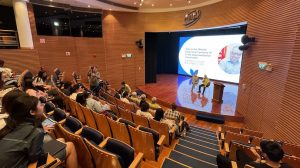Vision-impaired people have become a “reachable target market” for tourism operators, but there is much room for improvement regarding creation of positive experiences for this visitor segment, say IFT scholars Dr. Connie Loi and Dr. Frances Kong. In a new academic paper, the researchers concluded that “people with vision impairment comprise an often-neglected market segment” when it comes to tourism.
“People are disabled more by inconsiderate design, inaccessible services, and other people’s unaccommodating attitudes than by their own impairment,” Dr. Loi and Dr. Kong wrote. Their paper, “Tourism for All: Challenges and Issues Faced by People with Vision Impairment”, was published earlier this year in the academic journal Tourism Planning and Development.
The IFT scholars noted that removal of physical barriers was just one of the changes needed to ensure vision-impaired tourists had an enjoyable experience. “In addition to physical barriers, it is important to consider the way the staff interact with people with vision impairment,” they stated, adding, “very few tourism organisations engage in such awareness training.”
Dr. Loi and Dr. Kong said governments could offer training programmes to tourism businesses on how properly to serve disabled customers. “At the very least, staff in the tourism industry should brief people with vision impairment about emergency exits and procedures, for safety reasons,” they stated.
The World Health Organization estimates that in 2010 the number of vision-impaired people in the world was 285 million, with 39 million of them blind and 246 million having low-quality vision. More than a quarter of the people recorded as having vision impairment lived in China, according to the organisation’s estimates.
A recent piece of medical research by a team of international experts led by Rupert Bourne from Anglia Ruskin University in Cambridge, and by Seth Flaxman from the University of Oxford, forecast that – if treatment were not improved via better funding – the number of blind people globally would triple by 2050. The team’s paper – published in August – concluded that “the growth and ageing of the world’s population is causing a substantial increase in the number of people with blindness and vision impairment, which [increase] appears to be accelerating.”
Different needs
“It is clear that people with vision impairment have as equal a desire to experience the world at their own pace and from their own perspectives as do sighted people,” Dr. Loi and Dr. Kong wrote in their academic paper. They added: “Because of their disability, people with vision impairment face many issues and challenges at home as well as during travel. These issues may hinder their desire to travel and cause them to forgo the multi-sensory enjoyments of tourism, which, for many, can be important means of diversion.”
Their research conclusions were based on in-depth interviews with a group of 16 people from Macao, and followed a qualitative approach. The interviewees had participated in a 2-day tour to Zhuhai, in Mainland China: 8 were vision-impaired (with different levels of sight loss), and the remaining 8 were their respective travel companions, namely either friends or family members.
The trip was organised by the Macau People with Visually Impaired Right Promotion Association. It is a non-government organisation focusing on providing support to people with vision impairment. The 2 IFT scholars joined the visit, as voluntary helpers and external observers.
The researchers said that “most interviewees agreed with the benefits of taking holidays, specifically in terms of spending quality time with friends and family members, breaking away from the daily routine, and being able to experience different parts of the world with their other senses rather than just listening to television.”
The IFT scholars said that developing tourism products for people with disabilities was “a vital element in [a] sustainable tourism development policy”. They noted however that vision-impaired tourists did not form a homogeneous group: the people within the category varied in the level of their sight loss, making the group heterogeneous.
The researchers divided the concerns reported by vision-impaired travellers into 3 major areas: issues centred on the individual, such as lack of self-confidence and dependence on companions; social barriers, including stereotypes surrounding people with vision impairment, cultural differences and government policies; and environmental problems, such as physical barriers and lack of specialised support equipment for vision-impaired people.
“Depending on the level of eyesight loss, most people with vision impairment require family members or friends to accompany them during travel,” the scholars stated. “This poses a certain level of anxiety or stress, as they are conscious that their wish to travel may increase the burden of care on their friends and family.”
Dr. Loi and Dr. Kong suggested that appropriate education at large would be helpful in promoting a sense of empowerment among vision-impaired tourists, as would the use of technology and other supporting tools.
Tourism destinations, in their turn, should enact legislation to curb the risk of discrimination against people with disabilities, the researchers stated. Governments should improve city planning to boost mobility and reduce physical barriers, and provide audio description technology at major tourism attractions and on public transportation, the IFT scholars added.
Suggestions to tourism operators made by Dr. Loi and Dr. Kong included making use of technology to target more efficiently people with vision impairment, namely through use of social media and the internet. Accepting alternative payment methods such as credit or debit cards instead of cash was also suggested, as people with vision impairment often reported trouble identifying the face value of money, including that of foreign paper notes.
More info
IFT Assistant Professor Dr. Frances Kong Weng Hang has a Ph.D. in Cultural Heritage Tourism from Nottingham Trent University, in the United Kingdom. Her research interests include cultural heritage tourism, tourism planning, and disabled travellers. At IFT, she teaches topics related to tourism and hospitality.
http://dx.doi.org/10.1080/21568316.2016.1204357









